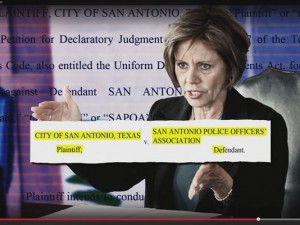There were two issues at play during Tuesday’s hearing to address the constitutionality of the 10-year evergreen clause in the city’s contract with firefighters.
One is whether it’s good public policy to lock two opposing sides into a labor deal for up to 10 years after its expiration date, if no new agreement can be reached. The other is whether such a clause is unconstitutional.
On the first issue, the city — as represented by attorney Michael Bernard — had a valid point.
As city reps repeatedly have argued, an evergreen clause of 10 years inevitably tips the bargaining scales heavily in the direction of whichever side came away happier with the last negotiated deal. In the case of San Antonio, that means police and firefighters have major leverage over the city, which wants to scale back public-safety benefits costs.
But judges make decisions based on the law, not on the question of what makes for effective public policy. That’s the task before visiting District Judge Martha Tanner, who is weighing the city’s motion for a summary judgment on the evergreen clause.
And it’s on the legal question that the city’s case starts to look flimsy.
The hearing was the precursor to a similar battle scheduled next week between the city and the San Antonio Police Officers Association. The evergreen clauses in the police and fire contracts will extend through Sept. 30, 2024, if new agreements are not reached.
Bernard, the former San Antonio city attorney, made the most of some weak material Tuesday.
“The issue will always be, and will be in this case, what constitutes a debt,” Bernard said.
He argued the financial demands imposed by the evergreen clause will force the city to create debt, thereby violating a section of the Texas Constitution that prohibits deficit spending.
Given that active-duty firefighters’ benefits only amount to about 3 percent of the city’s $1.1 billion general-fund budget, this premise required a considerable suspension of disbelief.
Bernard agreed with San Antonio Professional Firefighters Association counsel Ricky Poole that the evergreen clause will not push San Antonio into insolvency. But he suggested it will bind the city’s fiscal hands and force it to make unwanted cuts in roads, sidewalks or other needed infrastructure improvements.
If you accept that argument, it makes for a compelling public-policy debate over what the city might need to cut and what it should choose to preserve. But municipal public-policy debates are meant for City Council chambers, not courtrooms.
As Poole mentioned with great regularity, the city is challenging the constitutionality of a clause it agreed to in the firefighters’ 2009 collective-bargaining deal. In fact, evergreen clauses have been a part of every collective-bargaining agreement between the city and the firefighters since 1986, with no previous constitutional challenge from the city.
In 1989, then-Assistant City Attorney Tom Finlay gave the City Council the following opinion on the constitutionality of the evergreen:
“The question that has been posed is whether this agreement creates a debt as used in the Constitution. Our opinion is that it does not.”
Bernard, citing his own history as a city attorney, sarcastically commended Poole for giving so much credence to Finlay’s opinion. Bernard described the opinion as having “a nice PR flavor to it,” the implication being that it doesn’t carry much legal worth.
Bernard, however, couldn’t deny Poole’s point that none of the legal precedents the city cited dealt with collective-bargaining contracts. To Bernard, this absence of on-point legal precedent simply was the result of cities such as San Antonio kicking the issue down the road for decades.
“We’re not kicking the can down the road anymore,” he told Tanner.
A key moment came when Poole pointed out that an evergreen clause is a “two-way street” that limits and protects both sides. He noted that while the evergreen is protecting firefighters’ rich benefits, it’s also preventing them from receiving pay raises.
He also said that if the city succeeds in its mission to invalidate a piece of a contract it negotiated, approved and signed, the entire collective-bargaining process for public-safety employees will be a casualty.
And that’s where the city’s flawed legal position could start to create public-policy problems.
ggarcia@express-news.net


